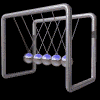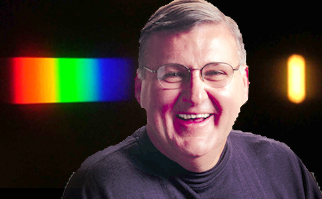Workshops
To Discuss or Schedule a Workshop or Lecture with Chris,
Introducing Force and Motion
With an emphasis on exploration and experimentation, this workshop will examine inquiry-based methods of introducing the concepts of force, motion and energy to your students. Specifically, instructional activities relating to the following areas of physics will be addressed: 1) Kinematics: Describing How Things Move; 2) Newton’s Laws of Motion; 3) The Conservation of Momentum and Energy.
Taking the Physics Classroom into the World
The world outside the classroom provides endless opportunities for students to discover and understand nature’s laws. Through experiments and exploratory activities performed in non-traditional settings, students of all ages can be made aware of the beauty and wonders of science. Furthermore, such experiences make evident the myriad applications of physics in everyday life. In this workshop you will learn how the use of auditoriums, parking lots, amusement parks, interactive science centers, the home, and other environments can make science come alive. When possible, the use of some of these venues will be demonstrated.
Communicating Science with the Arts
The arts and science offer unique ways of viewing and understanding our world; however, they are not unrelated. The connections between these seemingly disparate disciplines are numerous and may serve as vehicles for teaching many topics in science, especially optics. This workshop will show you how you can incorporate the visual and performing arts in your science classroom to enhance student learning.
Introductory Physics: From the Concrete to the Abstract
The Learning Cycle is an approach to science instruction developed by Atkin and Karplus. Based on the findings of Piaget, this approach puts the phenomena first. Names and numbers are introduced only after students are allowed direct contact with the phenomena. Although there are variations on the theme, the essential learning cycle consists of three phases: exploration, concept development, and application. Concrete examples of the use of the learning cycle in introductory physics will be presented and the theoretical implications of this method of instruction discussed.
Teaching Light and Color
Optical phenomena are immediate, captivating, and relevant to our students. The goal of this workshop is to provide participants with ideas for demonstrations and experiments that demonstrate real-world applications of optics and promote conceptual understanding of optics and wave phenomena. Workshop topics will include photography, anamorphosis, luminescence, color mixing, polarization, light wave communications, and visual perception. Each workshop participant will receive “make-and-take” apparatus relating to these topics.
Let’s Get Physical with Sound
The study of sound should be fun and exciting for your students! In this workshop you will become acquainted with the basic principles of sound and wave motion through a series of experiments that you can easily replicate in your own classroom. I will introduce you to a wide variety of inexpensive, student-centered activities designed to promote conceptual understanding. Applications of acoustics such as sound recording and reproduction, light beam communications, the Doppler Effect, and the physics of music are topics that kids want to know about! Both “make-and-take” devices and museum exhibits will be used to investigate these and other timely topics. Join us to learn about some exciting ways of teaching “sound” concepts to your students!
OUR PURPOSE
In our Workshops, teachers learn how to bring inquiry and exploration to their classrooms by experiencing student-centered pedagogy first hand. Each Workshop consists of a collection of activities that follow the constructivist model. During the Workshop, teachers are given a taste and feel of an inquiry-based classroom by being actively engaged in their own learning.
Science Education Professional Developement
DISCOVERY SCIENCE
with Chris Chiaverina






